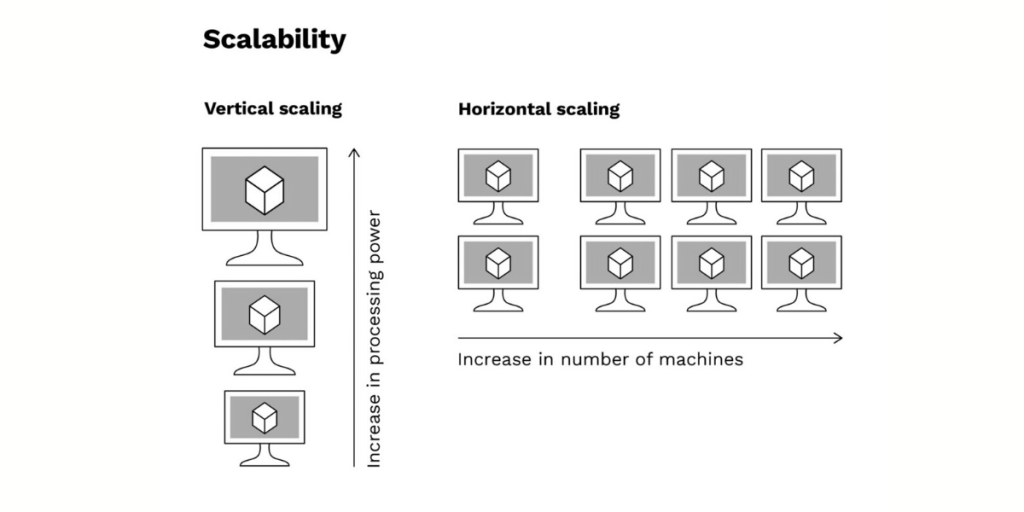MiroTalk SFU - Vertical & Horizontal Scaling

Overview
Scale MiroTalk SFU to handle 100-1000+ concurrent users across multiple rooms.
Two simple options:
- Vertical Scaling: Single powerful server (50-100+ users)
- Horizontal Scaling: Multiple servers + Load Balancer (100-1000+ users)
Option 1: Vertical Scaling
Best for: 50-100+ concurrent users
Configuration
SFU_ANNOUNCED_IP=YOUR_PUBLIC_IP
SFU_SERVER=true
SFU_NUM_WORKERS=8
SFU_MIN_PORT=40000
SFU_MAX_PORT=49999
Capacity
- 4-core server: ~400 users (4 workers × ~100 users)
- 8-core server: ~800 users (8 workers × ~100 users)
- 16-core server: ~1600 users (16 workers × ~100 users)
Formula: numWorkers × ~100 users = capacity
Note
Official mediasoup docs state ~500 consumers per worker. In a typical room with N users sending audio+video, each user consumes 2×(N-1) streams. For 4-person room = 24 consumers total, so one worker can handle many rooms simultaneously.
Option 2: Horizontal Scaling + Load Balancer
Best for: 100-1000+ concurrent users across multiple rooms
Architecture
Load Balancer (Nginx/HAProxy)
lb.yourdomain.com
|
┌──────────────────┼──────────────────┐
| | |
SFU #1 SFU #2 SFU #3
1.1.1.1 2.2.2.2 3.3.3.3
~800 users ~800 users ~800 users
Key: Users in the same room stay on the same server (sticky sessions).
Step 1: Configure Each SFU Server
# Server 1
SFU_ANNOUNCED_IP=1.1.1.1
SFU_SERVER=true
SFU_NUM_WORKERS=8
SFU_MIN_PORT=40000
SFU_MAX_PORT=49999
# Server 2
SFU_ANNOUNCED_IP=2.2.2.2
SFU_SERVER=true
# ...
# Server 3
SFU_ANNOUNCED_IP=3.3.3.3
SFU_SERVER=true
# ...
Step 2: Setup Load Balancer
Nginx Configuration:
# /etc/nginx/sites-available/mirotalk-lb
upstream mirotalk_backend {
hash $uri consistent; # Hash based - REQUIRED
server 1.1.1.1:3010 max_fails=3 fail_timeout=30s;
server 2.2.2.2:3010 max_fails=3 fail_timeout=30s;
server 3.3.3.3:3010 max_fails=3 fail_timeout=30s;
}
server {
listen 443 ssl http2;
server_name sfu.yourdomain.com;
ssl_certificate /path/to/cert.pem;
ssl_certificate_key /path/to/key.pem;
location / {
proxy_pass http://mirotalk_backend;
proxy_http_version 1.1;
# WebSocket support
proxy_set_header Upgrade $http_upgrade;
proxy_set_header Connection "upgrade";
proxy_set_header Host $host;
proxy_set_header X-Real-IP $remote_addr;
# Keep connections open for WebRTC signaling
proxy_read_timeout 600s;
proxy_send_timeout 600s;
}
}
What Happens Here
hash $uri consistent; makes Nginx route everyone joining the same room URL (e.g., /room/xyz) to the same SFU instance, and if a server fails, only a few rooms are reassigned to other nodes.
HAProxy Configuration:
# /etc/haproxy/haproxy.cfg
frontend sfu_frontend
bind *:443 ssl crt /path/to/cert.pem
default_backend sfu_backend
backend sfu_backend
balance uri whole # Balance based on the full URL (e.g., /room/xyz)
hash-type consistent
option http-server-close
option forwardfor
server sfu1 1.1.1.1:3010 check ssl verify none
server sfu2 2.2.2.2:3010 check ssl verify none
server sfu3 3.3.3.3:3010 check ssl verify none
What Happens Here
balance uri whole makes HAProxy send everyone joining the same room URL (e.g., /room/xyz) to the same backend, while hash-type consistent ensures smooth failover if a server goes down, each SFU instance handles its own rooms independently with full WebSocket and SSL support.
Step 3: Configure Firewall
# Check the firewall Status: (active/inactive) If active then allow traffic
ufw status
# On each SFU server
sudo ufw allow 3010/tcp
sudo ufw allow 40000:49999/udp
# On load balancer
sudo ufw allow 80/tcp
sudo ufw allow 443/tcp
Step 4: Test
# Check individual servers
curl https://1.1.1.1:3010/
curl https://2.2.2.2:3010/
curl https://3.3.3.3:3010/
# Check load balancer
curl https://sfu.yourdomain.com/
Deploy 3-Node Cluster in 30 Minutes
On each server (1.1.1.1, 2.2.2.2, 3.3.3.3) just follow the self-hosting guide here
On load balancer server:
# Install Nginx
sudo apt update
sudo apt install -y nginx certbot python3-certbot-nginx
# Get SSL cert
sudo certbot --nginx -d sfu.yourdomain.com
# Configure (use Nginx config above)
sudo nano /etc/nginx/sites-available/mirotalk-lb
sudo ln -s /etc/nginx/sites-available/mirotalk-lb /etc/nginx/sites-enabled/
sudo nginx -t
sudo systemctl restart nginx
Done! Access: https://sfu.yourdomain.com
Capacity Planning
| Setup | Concurrent Users | Cost/Month (€) |
|---|---|---|
| 1× 8-core, 16GB | ~800 | €14-20 |
| 3× 8-core, 16GB + LB | ~2400 | €47-65 |
| 5× 8-core, 16GB + LB | ~4000 | €75-105 |
Provider Comparison (8 vCores, 16GB RAM)
| Provider | Plan | CPU | RAM | Storage | Traffic | Price/Month |
|---|---|---|---|---|---|---|
| Hetzner | CPX41 | 8 vCPU | 16 GB | 320 GB SSD | 20 TB | €19.99 |
| Netcup | RS 2000 G11 | 8 vCores | 16 GB | 512 GB SSD | Unlimited | €17.99 |
| Contabo | VPS 20 | 8 vCores | 24 GB | 200 GB SSD | Unlimited | €14.00 |
Load Balancer Options
| Option | Cost/Month | Notes |
|---|---|---|
| Small VPS (Nginx) | €5-10 | 2 vCores, 4GB RAM sufficient |
| Hetzner LB | €5.39 | Managed, auto-scaling |
| Netcup VPS 500 G11 | €4.88 | 4 vCores, 4GB RAM |
Total Cost Examples

Premium Setup Hetzner:
- 3× Hetzner CPX41 (€19.99) = €60
- 1× Hetzner LB = €5.39
- Total: ~€65/month for ~2400 users
- ⚡ Best Performance: Hetzner - Premium network quality, best for production with high traffic

Balanced Setup Netcup:
- 3× Netcup RS 2000 (€17.99) = €54
- 1× Netcup VPS 500 (LB) = €4.88
- Total: ~€59/month for ~2400 users
- 🏆 Best Overall: Netcup - Perfect balance of price, performance, and reliability

Budget Setup Contabo:
- 3× Contabo VPS 20 (€14.00) = €42
- 1× Netcup VPS 500 (LB) = €4.88
- Total: ~€47/month for ~2400 users
- 💰 Lowest Cost: Contabo - Good for testing or budget-conscious deployments, but slower network
Bandwidth per user:
- Audio only: ~50–100 kbps
- SD video: ~300–600 kbps per stream
- HD video (720p): ~1–1.5 Mbps per stream
- Full HD (1080p): ~2–3 Mbps per stream
Need help?
Join our community forum and Happy Scaling! 🚀